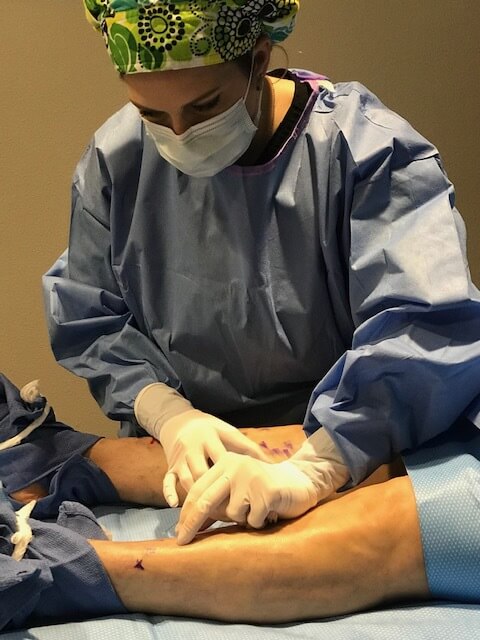The tissues of the human body are nourished through a consistent and healthy flow of blood from head to toe. This is a delicate system that functions effectively for most people. However, disruptions in blood flow have the potential to interrupt normal activities, cause pain, or create critical health issues. Blood clots are widely recognized as one of these threats and untreated varicose veins are one such contributor to blood clots.
The upward flow of blood from the feet to the heart is a long journey that competes against the force of gravity. This strenuous process can cause a breakdown of the venous structure, leading to discoloration, swelling, and twisting of the veins. These are known as varicose veins and most commonly occur in the legs. Varicose veins result in a pooling of stagnant blood, which can lead to loss of function, pain, blood clots, and other serious health issues.

Doctors have also now recognized the connection between the presence of varicose veins and a higher risk of post-surgical complications due to blood clots. For those asking how to prevent blood clots, many surgeons now recommend treating varicose veins prior to surgery to reduce risk.
This is especially prevalent with arthroplasty, such as hip replacement, knee replacement, and wrist osteoarthritis reconstructive surgery. According to an extensive study published in medical journals and shared by the U.S. National Institute of Heath, untreated varicose veins have been identified as a major risk factor for developing post-surgical blood clots in patients who undergo arthroplasty.
Understanding common medical terms can be an important part of the treatment process for patients. Thrombosis is the formation of a blood clot. Deep vein thrombosis is a more serious condition where blood clots form deep within a muscle.
1-MINUTE VARICOSE VEIN ASSESSMENT
Extended periods of standing and occupations that require it make people more susceptible for varicose veins. Higher rates of occurrence are seen with teachers, hospitality workers, nurses, first responders, and factory workers. Hormonal changes and some medical conditions can also increase likelihood, putting pregnant women at higher risk.

Medical advances have made today’s treatment of varicose veins a relatively common procedure, often on an outpatient basis. While you may not have arthroplasty surgery in your future, unexpected emergencies and medical procedures can also be complicated by untreated varicose veins. You are urged to seek treatment for varicose veins before it compromises your health in other ways.
Now that you understand the risk of blood clots and varicose veins, you should seek consultation for treatment if you can see the presence of or are experiencing any of the symptoms of varicose veins. Most treatment is covered by insurance.
General practitioners in Inland Empire, Riverside, San Bernardino, Moreno Valley, and surrounding areas of California refer their patients to Empire Vein Specialists. Their doctors are board certified vascular surgeons specializing in the treatment of varicose veins and other vascular problems. They are the #1 provider of VenaSeal®, the leading outpatient treatment in the USA. To schedule a free consultation, please call 1-800-VARICOSE today.